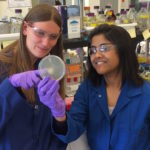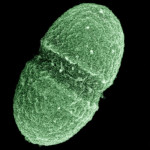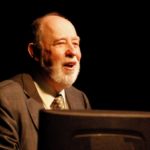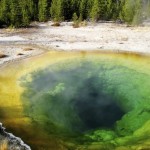Microbiomes are communities of microorganisms that live on and in people, plants, soil, oceans, and the atmosphere, playing important roles in each ecosystem. Today, the White House Office of Science and Technology Policy launched the National Microbiome Initiative, designed to advance the understanding of microbiome behavior and enable the protection of healthy microbiomes. With its Microbes to Biomes program, Berkeley Lab is well positioned to contribute. Both Mary Maxon, Principal Deputy for Biosciences, and Trent Northen, Interim Director of Environmental Genomics & Systems Biology, worked with Eoin Brodie of the Earth & Environmental Sciences Division and other leading scientists to co-author an mBio editorial that calls for a predictive understanding of Earth’s microbiomes to address 21st century challenges in the areas of energy, health, and environment. Read more at the Berkeley Lab News Center.
Scientists Image First Steps in DNA Transcription
Working at temperatures near absolute zero, scientists at Berkeley Lab and UC Berkeley have captured images of proteins at work in the early steps of DNA transcription. Eva Nogales, a senior faculty scientist at in the Molecular Biophysics & Integrated Bioimaging Division, UC Berkeley professor of biochemistry and a Howard Hughes Medical Institute (HHMI) investigator, led the new study, published today in the journal Nature.
This latest research comes seven weeks after Nogales unveiled an earlier milestone using cryo-EM technology to image details of transcription factor TFIID in gene expression. Read the full UC Berkeley press release on the newest Nature paper.
Berkeley Lab Scientists Brew Jet Fuel in One-Pot Recipe
 Scientists at JBEI have engineered a strain of bacteria that enables a “one-pot” method for producing advanced biofuels from a slurry of pre-treated plant material. The achievement is a critical step in making biofuels a viable competitor to fossil fuels. Read more at the Berkeley Lab News Center.
Scientists at JBEI have engineered a strain of bacteria that enables a “one-pot” method for producing advanced biofuels from a slurry of pre-treated plant material. The achievement is a critical step in making biofuels a viable competitor to fossil fuels. Read more at the Berkeley Lab News Center.
Fleming Awarded the Faraday Prize
Graham R. Fleming, senior scientist in the Molecular Biophysics & Integrated Bioimaging Division, has won the Royal Chemistry Society’s Faraday Lectureship Prize 2016. The prize was awarded for experimental and theoretical achievements that have redefined the study and understanding of fundamental chemical and photobiological processes in liquids, solutions and proteins. A particular emphasis in Fleming’s research is photosynthetic light harvesting and its regulation via nonphotochemical quenching.
Lab Startup CinderBio Featured in Newsweek
Startup CinderBio, founded by Molecular Biophysics & Integrated Bioimaging researchers Jill Fuss and Steven Yannone, was recently featured in Newsweek. Giving some background about the use of enzymes throughout history, the article describes how the company offers biodegradable enzymes that operate at higher temperatures and more acidic conditions than currently available enzymes. When used in biofuel production and industrial cleaning, the heat- and acid-tolerant properties of these enzymes allow for more efficient and affordable processes.
- « Previous Page
- 1
- …
- 185
- 186
- 187
- 188
- 189
- …
- 213
- Next Page »
Was this page useful?







